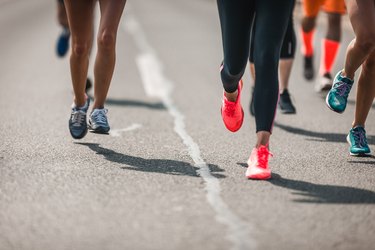
Although it might sound odd to talk about an allergy to cold temperatures or an allergy to exercise, these conditions do actually exist. In fact, these reactions are among the most common causes of itchy legs when running — but other factors may also be at play.
Tip
A number of factors can contribute to itchy legs when running. You may have certain types of allergies or poor circulation. Your doctor can help you narrow down the specific reason.
Video of the Day
Understanding Urticaria Itching
According to the American Academy of Family Physicians, exercise induced itching in the form of urticaria is "a condition that causes hives and other allergic symptoms. It can occur during or after exercise." The condition commonly appears during or immediately after vigorous exercise, such as running.
Video of the Day
The runner develops raised, red bumps on the skin (hives). As the hives spread, the skin looks red and blotchy and becomes extremely itchy. Although the condition is quite bothersome, this type of itchy legs when running is not life-threatening. In fact, the symptoms of urticaria typically dissipate within 10 minutes of the end of your run.
Read more: Why Do My Legs Turn Red After Exercise?
Allergies May Be the Culprit
If you only notice itchy legs while running in cooler temperatures, you might have a condition known as "cold urticaria," or an allergy to cold temperatures. The symptoms of cold urticaria are quite similar to those of exercise-induced urticaria, including red, itchy hives that spread across the skin.
If your hands are uncovered, you might also notice swelling in the hands. People with severe cases of urticaria might develop more serious symptoms, such as chills, racing heartbeat, swelling of the limbs and fainting. Mayo Clinic notes that the exact cause of cold urticaria is still unclear. Some people simply have allergic reactions to cold temperatures.
The Circulation Connection
In some cases, itchy legs while running might simply be caused by a lack of running. If you have not been running or exercising much lately, the capillaries in your legs collapse slightly. However, once you begin exercising again, your legs require an increased supply of blood.
As the flow of circulation to this area increases, the capillaries in your legs must expand to allow for more blood flow. As these capillaries expand, the nerves surrounding them send "itchy signals" to the brain. Fortunately, these symptoms typically stop after a few days of regular running.
Don't Rule Out Anaphylaxis
If you notice additional symptoms while running, you may have a more serious condition known as exercise-induced anaphylaxis. In addition to the itching hives, runners with this condition might also experience difficulty breathing, vomiting and fainting. If you continue running despite these symptoms, the condition might block the flow of oxygen to your heart and brain, resulting in death.
For some people, the condition is triggered simply by vigorous exercise. For about one-third, the condition is triggered by a combination of exercise and a specific food, according to Harvard Health Publishing. The condition appears to be on the rise since it was first identified in 1979.
Preventing Runners Itch
Fortunately, exercise induced itching related to anaphylaxis is the only life-threatening cause of itchy legs while running. Allergies to exercise or cold temperatures are not life threatening, except in very serious cases. However, to ensure your safety and comfort, there are certain steps you can take to prevent runners itch.
Read more: 4 Ways to Treat an Itch
Warm up and cool down for at least 10 minutes before and after your workout. If necessary, take short breaks throughout your run and allow your body to cool down and relax. If you are allergic to cold temperatures, dress in layers and cover any exposed areas of the skin while running. In the case of exercise-induced anaphylaxis, it might be necessary to adopt a less strenuous exercise, such as swimming.
Was this article helpful?
150 Characters Max
0/150
Thank you for sharing!
Thank you for your feedback!